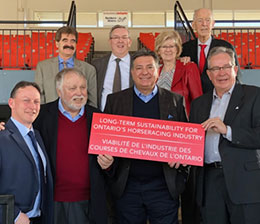- News
- Horse Racing
- Racing Preview
- AQHA Racing Challenge
- Breeding
- Sales
- Quick Stakes Results
- Detail Race Results
- Qualifiers
- Leader Board
- Leading Sires
- Videos
- Auction Leaders
- Q-Racing
Streaming Video

By Martha Claussen
AJAX, ONTARIO—MARCH 29, 2018—There is no question that the horse racing industry has battled hard for legislative backing in recent years. While many jurisdictions have been tremendously disappointed in the lack of assistance, breeders, owners, horsemen and equine businesses in Ontario are breathing a huge sigh of relief.
On March 26, the Ontario Ministry of Finance announced a $2 billion funding plan, which will support jobs in rural Ontario and strengthen local economies across the province. The new agreement will provide up to $105 million a year, for 19 years. It is slated to begin on April 1, 2019 and will also aid smaller racetracks.
The long-term funding agreement will also empower the horse racing industry to work together to make decisions about horse breeding, racing programs, capital investments and hiring. It will include specific measures focused on supporting community racetracks, including operational funding and purses.
The announcement was a huge turning point for the fifteen racetracks in Ontario and a broad spectrum of individuals who make their living in the racing and breeding industry. The majority of the racetracks run Standardbreds with Woodbine and Fort Erie offering Thoroughbred racing. Ajax Downs is the lone Quarter Horse racetrack in Ontario as Fort Erie was unable to keep their program going when casino slot revenue was pulled from their facility in 2012.
Bob Broadstock is the president of the Quarter Racing Owners of Ontario Inc (QROOI). As a Quarter Horse breeder, trainer and owner, he has been on the front lines of the battlefield and admits that they were struggling for survival.
"I’ll be honest; our industry was on the verge of collapse," stated Broadstock. "Those who made their living in racing were pushed to the point of fatigue to stay in business without funding."
Ajax Downs was able to continue to operate with slot revenue, but it was almost a break-even proposition that kept racing alive, but far from thriving. There was discussion of moving the Ajax Downs casino from the racetrack to a proposed site in Pickering. Broadstock noted that 1,700 jobs and the livelihood of around 300 families in Durham who make their living in Quarter Horse racing would have been in jeopardy.
Broadstock credited the late Leverne Perry, former executive director of the Louisiana Quarter Horse Breeders Association (LQHBA) for his efforts in ensuring that lawmakers knew the economic impact of the racing industry.
"Leverne always said how important it was to stay in close contact with legislators," acknowledged Broadstock. "We made an effort to connect with our officials so they understood the economic impact from racing."
One of the lawmakers who fought for the funding plan was Joe Dickson, the local member of Parliament serving the Ajax-Pickering region.
"Joe has always supported Quarter Horse racing, dating back to his time on the town council," said Broadstock. "Over the last few months, Joe has been instrumental to the government’s awareness of the specific needs of the Quarter horse racing industry. Working together we have had countless meetings making sure that the industry receives the required support."
Broadstock and other industry leaders fought hard for this reform. Their goal was never a short-term fix; they wanted their efforts to help racing and invigorate Ontario breeding and many related equine industry businesses.
"Since 2012, we protested and fought to turn the tide," he said. "Our goal was to work with lawmakers and strive for a long-term deal. We have been in negotiations for the last year and could not be more pleased. We are no longer dependent on slot revenue to keep our industry alive. This is a government investment that will provide funding for 20 years."
Martha Claussen served as publicity director at Sam Houston Race Park for ten years. She continues to be active in writing, fan education and Quarter Horse racing publicity in Texas, Louisiana and other regions in North America.

 Newsletters
Newsletters Facebook
Facebook